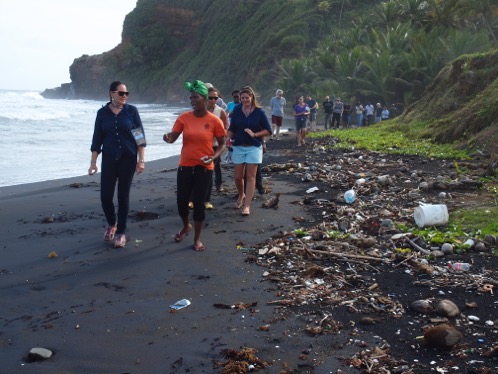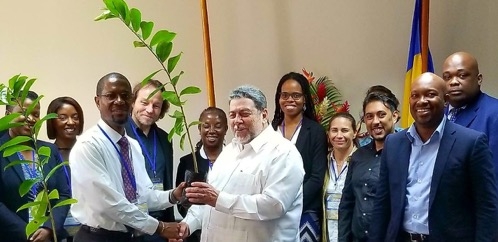ODU-led St. Vincent Workshop Explored Ocean’s Role in Caribbean-based U.N. Sustainable Development Initiative
February 20, 2018
 During a sustainability-related workshop in St. Vincent, which was joint project led by ODU’s MARI, a field trip introduced participants to on-the-ground challenges in the designated “geo-space” that are often caused by problems originating far outside the Caribbean. For example, this ecologically valuable turtle nesting beach had been cleaned only two months before the visit and plastics and other waste from all over the world had reassembled in a short time, according to organizer Hans-Peter Plag, professor of ocean, earth and atmospheric sciences and director of MARI.
During a sustainability-related workshop in St. Vincent, which was joint project led by ODU’s MARI, a field trip introduced participants to on-the-ground challenges in the designated “geo-space” that are often caused by problems originating far outside the Caribbean. For example, this ecologically valuable turtle nesting beach had been cleaned only two months before the visit and plastics and other waste from all over the world had reassembled in a short time, according to organizer Hans-Peter Plag, professor of ocean, earth and atmospheric sciences and director of MARI.
 Hon. Dr. Ralph Gonsalves, prime minister of Saint Vincent and the Grenadines, the prime minister presented to Joseph Smith Abbott (to the left of the Prime Minister), deputy permanent secretary in the Ministry of Natural Resources and Labour of the Government of the Virgin Islands, the first of 3,000 soursop trees that his government is providing to the Virgin Islands in support of hurricane recovery.
Hon. Dr. Ralph Gonsalves, prime minister of Saint Vincent and the Grenadines, the prime minister presented to Joseph Smith Abbott (to the left of the Prime Minister), deputy permanent secretary in the Ministry of Natural Resources and Labour of the Government of the Virgin Islands, the first of 3,000 soursop trees that his government is providing to the Virgin Islands in support of hurricane recovery.
Old Dominion University's Mitigation and Adaptation Research Institute (MARI) is jointly leading, with the National Oceanic and Atmospheric Administration (NOAA), a NASA-funded project that aims to identify and articulate knowledge and information needs for the implementation and monitoring ofthe United Nations' Sustainable Development Goals (SDGs) in Caribbean Small Island States (SIDS) while matching these needs to knowledge, tools and data.
In 2015, the United Nations agreed on the 2030 Agenda for Sustainable Development - the "Road to Dignity" as the former Secretary General of the United Nations characterized it. The agenda aims to reach 17 SDGs that are strongly interconnected and variable across different economic, social and cultural settings.
"Governments cannot implement the SDGs without the people, and they cannot implement them for the people. They have to implement them with the people," said Hans-Peter Plag, director of MARI and the principal investigator of the project.
To that end, a workshop on "Implementing and Monitoring the SDGs in the Caribbean: The Role of the Ocean" was held in January, 2018, in Saint Vincent. It brought together 42 participants from 17 countries representing a wide range of stakeholders.
The workshop facilitated a dialogue among a diverse range of participants including politicians, senior decision makers, scientists and academics from beyond the Caribbean region as well as government representatives and the people of the Caribbean SIDS, regional organizations and other experts about ways to make progress on the goals and develop an ocean-based economy in the region.
The workshop used a design-based approach to participatory modeling promoted by MARI, which starts with a community agreement on challenges present and the goals that are to be reached. This approach provides a basis to identify social, economic and environmental variables that need to be monitored, and to specify requirements for the monitoring. Finally, these requirements can then be matched with existing observations and data products so gaps may be identified and addressed, Plag said.
The Hon. Saboto Caesar, minister of agriculture, forestry, fisheries, rural transformation, industry and labour of the government of Saint Vincent and the Grenadines, said the workshop was largely about solving problems that were not created by residents of the Caribbean region.
"We need to come up with relevant solutions, grounded in practical actions," he said, emphasizing that solutions should be grass-roots efforts and not government-based. "A way to do this is to implement SDGs in a small space, a 'geo-space for SDGs,' to prove we can do it over a large space."
Bringing together many groups that often don't interact initiated many new relationships and collaboration initiatives. Christopher Corbin, of the Jamaica-based United Nations Environment Programme, said the workshop offered a unique opportunity to identify regional needs and priorities, the relative strengths of each agency and potential partnerships for implementation at the local level.
A key element of the discussion was creation of the "Blue Economy," which seeks to establish a sustainable use of marine resources as a component of the SIDS economies, in alignment with targets of the 2030 Agenda for Sustainable Development.
"A growing number of Caribbean countries are exploring national development strategies that are underpinned by ocean resources, said Dr. Julian Roberts, Blue Resources, U.K.. "As development of marine areas increases in the future, conflict between competing interests can also be expected to increase. It will be difficult to resolve such conflicts without a more comprehensive and integrated approach to marine planning and decision-making, which recognizes the interactions and the interdependent nature of the various systems on islands and, therefore, the inherent interconnections between the SDGs."
Workshop deliberations resulted in a number of findings and recommendations of relevance for the science communities, and MARI will utilize these recommendations in follow-on activities.
"Achieving the SDGs requires bold thinking and even bolder action. We are all working together towards common, practical solutions," Corbin said. "Many of the common threats faced by the SIDS are also threats to the U.S. coasts. They include sea level rise, increasing sea surface temperature, ocean acidification, coral reef bleaching, micro-plastic pollution, mangrove and sea grass bed disappearance, coastal erosion, invasive species (in particular Sargassum and Lionfish), damage from cruise ships/intensive tourism, water and terrestrial pollution, land reclamation and conversion, ocean floor and sand mining, onshore development, lack of fish stock agreements and enforcing of those that exist and a general decline in health of marine waters and ecosystems. Government ministries across the region are largely operating in silos, and among the SIDS of the Caribbean, there is limited capacity and data sharing leading to a lack of evidence-based and data-based support for policy development."
During a participant delegation meeting with the Hon. Ralph Gonsalves, prime minster of Saint Vincent and the Grenadines, the prime minister noted that the workshop initiative was supporting his country's focus on being a voice for small island developing states of the world.
MARI is now taking the lead in follow-up activities to fully develop and implement the small island geo-spaces for SDGs. MARI aims to increase the number of ODU faculty supporting the implementation of the 2030 Agenda with collaborative research and opportunities for students to engage in activities. Interested faculty and students should contact hpplag@odu.edu.

